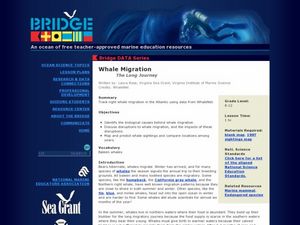Curated OER
Whale Migration - The Long Journey
Marine biology learners examine right whale sighting data from the WhaleNet website. They plot the data on a map and write down the number of adults and calves spotted. Questions accompany the data analysis activity, making this a...
Curated OER
Marine Fisheries Management
Almost 200 slides make this a vast collection! It is a quirky collection, titled "Marine Fisheries Management," but having little to do with that occupation. What you will find are two-toned blue backgrounds with no pictures, but a few...
Curated OER
Ocean World
In this components of the ocean worksheet, students answer 20 questions about various species in the ocean such as plankton, different types of whales, sharks, and herring. Students also answer questions about the volume of water in the...
Curated OER
Whale Word Search
In this whale vocabulary word search worksheet, 3rd graders will find and circle the names of nine different types of whales. The words are listed up, down, across and diagonally.
Curated OER
Whales
Learners compare and contrast the two types of whales. In this biology instructional activity, students research the characteristics of their assigned whale. They compile their findings in a folder.
Reed Novel Studies
Dolphins of the World
Pair a novel study of Island of the Blue Dolphins by Scott O'Dell with a presentation on dolphins. The 37-slide PowerPoint shows different types of dolphins all around the world, includes a brief description of each, and provides a photo...
Teach Engineering
Machines and Tools (Part 2)
Which pulley system will give us a whale of a good time? Teams compare the theoretical and actual mechanical advantages of different pulley systems. They then form a recommendation for how to move a whale from an aquarium back to the ocean.
Curated OER
How Big is a Blue?
Students determine the length of different whales using a rope marked off and color coded to each length. They create life-size scale drawings of whales on butcher paper.
Curated OER
Whale Data Cards
In this whale facts worksheet, students cut out the whale cards and fill them out with information that includes the whale type, length, weight, diving depth, and geographic range.
Curated OER
Draw a Blue Whale
Students follow step-by-step directions to draw a whale. They sketch the shape of the whale first, experiment with mixing a variety of watercolors second and then add a layer of coarse salt to the drawing for a textured effect.
Curated OER
Should We Hunt the Largest Animals on the Planet?
Students discover details about whaling. In this environmental stewardship instructional activity, students research selected websites to locate information about commercial whaling and its implications.
Curated OER
What Can Be Blue?
In this reading worksheet, students inspect 6 pictures and read the sentence accompanying them. Example: "Tricycles can be blue." Students color each picture a shade of blue.
Curated OER
The Whale Poem
Young scholars watch a whale video clip for information. Students brainstorm on the facts that they learned about whales. Young scholars use the Internet to find information and images about whales. Students write and publish a whale poem.
Curated OER
Internet Quests: Mammals
In this science and technology worksheet, students use reference books or Internet searches to find facts about the blue whale, beaver, bat and echidna. Students answer 20 questions about each mammal, fill out charts and illustrate facts.
Curated OER
IS A BLUE WHALE THE BIGGEST THING THERE IS?
First graders explore measurement in relation to size of objects.
Curated OER
Blue Planet: Frozen Seas
Learners study the animals from the Arctic and how they have adapted. In this ocean lesson students create a poster about their given animal and present it to the class.
Curated OER
Whale Form and Function
Students identify similarities and differences in specializations of morphology among a variety of cetaceans and approximate the reasons for these specializations.
Curated OER
"Is a Blue Whale the Biggest Thing There Is?" by Robert Wells
Learners discuss how big is big. They compare the area and perimeter of an acre and a football field.
Curated OER
Blue Planet: Tidal Seas
Young scholars investigate how tides affect sea life. In this video based lesson plan, students view a video on how tides affect sea life. They do web-based research to find the answers to a series of questions and then play Tidal Trivia...
Curated OER
Using Operations
In this problem solving instructional activity, students read the strategies and steps to solve word problems. Students solve 2 problems about blue whales.
Curated OER
Why the Whales Came- The Beach
In this why the whales came worksheet, students add adjectives and adverbs to a paragraph about nature. Students fill in twelve adjectives or adverbs from given words and then write sentences of their own.
Curated OER
Welcome to My Zoo
In this animal facts worksheet, students fill in informational facts about the following animals: elephants, cheetahs, pandas, blue whales, turtles, and kangaroos.
Curated OER
Convert Metric Units of Length
In this metric unit worksheet, students use a table to solve problems related to length of different types of whales using centimeters, meters and kilometers.
Other popular searches
- Blue Whales Life Cycle
- Big Blue Whales
- Writing About Blue Whales
- Blue Whales Graph
- Pictures of Blue Whales
- Learning About Blue Whales
- Orca and Blue Whales
- Blue Whales Model
- Or Ca and Blue Whales

























